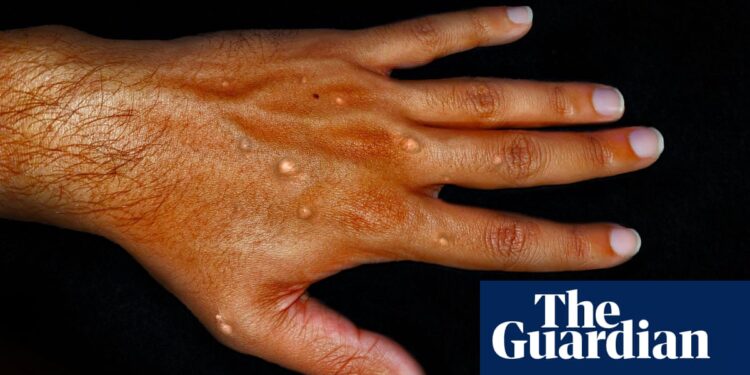New South Wales is urging those at risk of contracting mpox to get vaccinated as the state records its largest outbreak, which the top health official has described as “very concerning”.
The NSW chief health officer, Dr Kerry Chant, confirmed there had been 433 cases since 1 June 2024, the state’s biggest outbreak since the first case in May 2022.
She described the rapidly rising numbers of mpox as “very concerning”, with 26 people requiring hospitalisation due to severe symptoms.
The majority of these hospitalisations have been among those who have received one or no dose of the vaccine, she said. Infections among fully vaccinated people tended to be milder and for a shorter period.
Almost 40% of the 433 people infected people were fully vaccinated, 14% had received one dose, and almost half were not vaccinated, she said.
Two free doses of the mpox vaccine will be available for men who have sex with men, sex workers and their sexual partners, regardless of their Medicare status. Those who have received one dose can receive their second dose 28 days after their first.
The call comes after similar warnings in Victoria where, as of 21 August, there were 120 cases identified since April 2024. Mpox cases across the country have risen substantially in 2024, after Australia recorded only 26 cases in 2023.
“Anyone can get mpox, however, the virus is mainly spread by close skin to skin contact and people who are at highest risk of mpox are men who have sex with men and sex workers, so we are urging them to complete their vaccinations as two doses can provide vital protection against severe illness caused by the virus,” Chant said.
She confirmed that no cases of the new mpox virus strain, clade 1b, observed in central and west Africa since January 2023, had been seen in Australia.
after newsletter promotion
Michael Woodhouse, the chief executive of ACON, a NSW health organisation for LGBTQ+ communities, urged those at risk to get fully vaccinated.
“Our communities have a long history of doing what it takes to protect ourselves and our partners,” he said. “Now is one of those times.”
The Western Sydney local health district sexual health specialist, Dr Rohan Bopage, said mpox spreads through close skin-to-skin contact, including sexual contact, and often starts with small pimple-like skin lesions.
It also spreads through sharing items such as bedding, towels or clothes, he said, and can spread to others until lesions resolve.
He urged people to be aware of symptoms, including mild fever, headache, fatigue, swollen lymph nodes, mouth ulcers and rectal pain.
While most cases are mild, he urged people with any symptoms to contact their GP or sexual health service.







